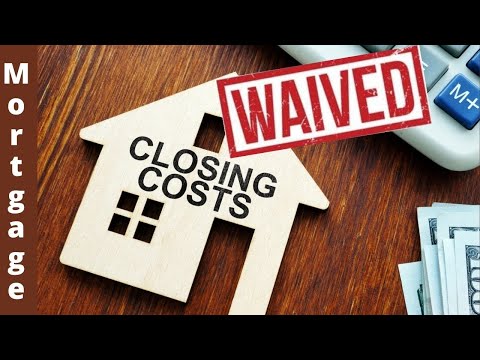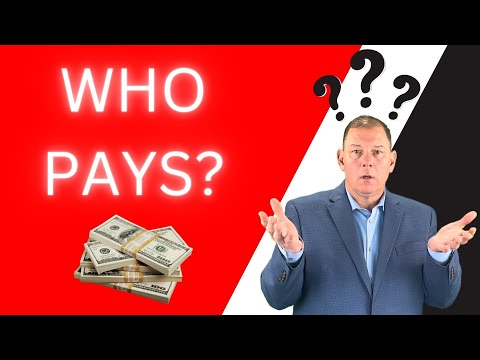Buying a home is an exhilarating experience, yet the path is paved with expenses that can make the plastic in your wallet quiver in fear—particularly when it comes to closing costs. But what if I told you there’s a secret handshake in the real estate world that could lead to waving goodbye to those extra charges? Well, maybe not a handshake exactly, but certainly some savvy strategies that could alleviate the financial burden. Today, let’s pry open the treasure chest and discover how to get closing costs waived when buying your dream home.

Unlocking the Secrets: How to Get Closing Costs Waived When Buying a Home
Understanding Closing Costs: The Essentials Before Waiving Them
Before you can wave them off, you’ve got to understand what these closing costs are all about. Simply put, they’re the fees and expenses you pay to finalize a mortgage beyond the property price—kinda like the final sprint after a marathon. From appraisal and attorney fees to title insurance and transfer taxes, the list can stretch longer than a summer day.
Diving into the numbers, nationwide, closing costs can nibble away at 2-5% of the purchase price. But hey, don’t forget about the regional bite—some areas are known to be hungrier for these costs than others.
Strategies for How to Get Closing Costs Waived Through Negotiation
Hold on, don’t you dare sign that check yet! Negotiation is the name of the game, and it’s time to transform into a master negotiator. Chat up your lender or sweet talk the seller—they can sometimes cover part or all of your costs. Think of it like a chess game, one where you’re aiming for checkmate without giving away your queen.
Imagine this: a recent case study showed a cunning buyer convincing the seller to cover closing costs in exchange for a slightly higher offer. Pretty nifty, huh? Remember, every dime kept is a dime earned.

Exploring the No Closing Cost Mortgage Option’s Viability
You’ve probably heard the whispers about no closing cost mortgages, right? Sounds too good to be true, but here’s the scoop: instead of paying costs upfront, they get added to your loan through a higher interest rate or bigger loan balance. The million-dollar question is whether this Robin Hood-like approach is right for you. Well, consider your long-term relationship with the loan—sometimes it’s a marathon, not a sprint.
The Role of Lender Credits in Reducing Upfront Homebuying Costs
“Hey, what’s this lender credit business?” you may ask. Imagine a lender saying, “I’ve got this,” at the cafe of home buying. In exchange, they may adjust your loan terms. To pull this off, you’ll need negotiation skills that could make a car salesman blush. Numbers are like putty in the hands of a prepared buyer.

| Strategy | Description | Pros | Cons | Tips |
|---|---|---|---|---|
| Negotiate with the Seller | Ask the seller to pay a portion or all of the closing costs as a seller credit. | Reduces upfront costs for the buyer. | Not all sellers may be willing or able to cover costs. | Highlight benefits to the seller, such as a potentially faster sale or meeting the buyer’s price point. |
| No-Closing-Cost Refinance Options | Choose between higher interest rates over the life of the loan or folding the closing costs into the loan balance. | Eliminates upfront closing costs. | Pay more over time due to interest or larger loan amount. | Compare long-term costs between the two options and consider your financial future. |
| Question Changes in Closing Costs | Question the lender if the closing costs increase from the original Loan Estimate. | Potentially uncover errors or negotiate reductions. | Requires time and understanding of the loan process. | Be prepared with documentation and be clear about disparities. |
| Negotiate with your Lender for Refinance | Specifically negotiate closing costs if you are refinancing, especially with your current lender. | Can lead to reduced costs with an established lender. | Negotiations may not result in lowered costs. | Build your case around your history with the lender and market comparisons. |
| Seller Tax Deductions | Inform the seller that offering a credit for closing costs is a tax-deductible expense, which may incentivize them to do so. | Makes negotiations with the seller more appealing. | Seller’s tax benefits may not be a priority for them. | Consult with tax professionals to understand the exact benefits. |
| Comparison Shopping | Compare closing cost waivers or reductions among different lenders before settling. | Find the best financial deal available. | It may be time-consuming and requires diligent research. | Obtain official Loan Estimates to make accurate comparisons. |
Creative Financing: Alternative Solutions if You Can’t Afford Closing Costs
For those scratching their heads about how to toss closing costs out the window, creative financing is your BFF. From seller financing—a kind of let’s-skip-the-banks tango—to lease-options that say “let’s date before we marry,” there are ways to avoid upfront fees. And don’t forget about tightening that belt to save up—every penny in your piggy bank is an armor against these costs.
Federal and State Programs: Aiding Buyers Who Can’t Afford Closing Costs
Sometimes, the cavalry comes in the form of Uncle Sam or your friendly state government. Yes, there are programs out there that swoop in like superheroes for those who can’t shake off closing costs. Peek into your state’s offerings—some are as welcoming as a grandma with a tray of cookies—and you might just qualify for that extra push.
The Art of the Deal: Crafting Purchase Agreements to Minimize Closing Costs
Legal gibberish in purchase agreements? Pfft, it’s more like a treasure map. With the right phrases and clauses, you can trim those closing costs down to size—negotiate with the seller and you could have them pay it! A recent deal saw a sly buyer pull off a win-win: the sweet harmony of lower costs for them, and a tax edge for the seller.

The Long-Term Implications of Waived Closing Costs on Your Mortgage
Before you jump with joy at waived costs, consider the butterfly effect on your mortgage. Forgoing upfront payment can mean more dollars spent in the long run. So, crunch those numbers, forecast your financial weather, and decide if this is just a summer fling or a binding marriage.
Tips from Industry Insiders: How to Approach Lenders and Sellers
Ever wish you could grab a pint with a real estate mogul and milk them for secrets? Well, your wish is my command. Insiders spill the beans that a polite but firm approach with lenders during a refinance can save you from a cash hemorrhage. Work with your current lender and you might be surprised at their generosity.

Navigating the Negotiation Maze: Advanced Tactics to Sidestep Closing Costs
Now, let’s get down to the nitty-gritty—how to get closing costs waived with mind games that would make Freud proud. Strategic flattery, leveraging competition, and timing your ask when lenders are hungriest for deals are all sharp arrows in your quiver.
Post-Waiver Considerations: Maintaining Financial Health After Closing
So, you’ve danced around the closing costs landmines like a ballet star, but now what? Keep that momentum going with a solid financial game plan. Think ahead about mortgage payments, start a rainy-day fund, and keep your eye on the prize—financial freedom.
Making the Dream a Reality: Final Thoughts on Evading Closing Costs
In the grand scheme of your home-buying saga, education and strategic thinking are your trusty steeds on this crusade. Don’t just play the game; redefine it with personal circumstances and market smarts. As the real estate world evolves, so should your tactics. And remember, sometimes the best move is the one no one sees coming.
Closing Costs Waivers: Netting You Savings as Big as Lee Majors’ Acting Legacy!
So, you’ve just found your dream home and you’re about to start the mortgage process. Closing costs? Ugh – sounds like a downer after house hunting, doesn’t it? Hang tight, because we’re about to spill some top-secret info on how to dodge some of those fees like a pro.
The Art of Negotiation: More than a Handshake
Believe it or not, haggling isn’t just for flea markets! When it comes to the home-buying process, it’s all about the negotiation game. Sellers are sometimes open to picking up the tab for your closing costs, especially if it means closing the deal faster than Lee Majors ran in the ’70s. Curious about how ageless this icon looks now? Head over and find out How old Lee majors Is( – believe me, he’s still outrunning Father Time!
Rocket League Mastery: The Metaphor
Okay, stick with me here – navigating a mortgage can be as perplexing as trying to figure out How To accept The license agreement in Rocket League.( Confused? Don’t sweat it, we’ve all been there. Just like mastering that game, understanding the ins and outs of mortgages and closing costs takes patience, a keen eye, and a good teacher (like us!).
Ballooning Your Way Out
Here’s a wild card: ever heard of a balloon payment? No, it’s not when you pay the clown at the party; it’s a hefty payment due at the end of your mortgage. But guess what? Sometimes, you can leverage the balloon payment definition( to restructure your costs and help waive those pesky closing fees. Who knew balloons could be so finance-friendly?
Ride the Waves of Home Buying
Alright, imagine this – your mortgage without hidden fees is as refreshing as catching the perfect wave courtesy of Surfair.( You’re on top of the world, or the wave – in this case. But getting there means having a solid credit score, so lenders think you’re as cool as the ocean’s breeze. This can boost your negotiating power big time!
A Factual Matter of Inquiry
Last piece of advice? Dig into your credit report like it’s a hot slice of apple pie – with care and anticipation. You’ll need to check for any factual data credit Inquiries( because these pesky little things can ding your score. The cleaner your report, the more leverage you’ve got. Remember, knowledge is power – and savings!
There you have it – secrets spilled like beans at a BBQ. Use ’em wisely, and you might just land a home closing as smooth as the one-and-only Lee Majors’ stunts. Happy house hunting!

Is there a way to get around closing costs?
Well, you can’t exactly pull a Houdini on closing costs, but there’s a trick or two up the sleeve. You might negotiate with the seller to cover some costs, hunt for no-closing-cost mortgages, or wrap ’em up into your loan if the lender allows it. Just remember, there’s no such thing as a free lunch; you’ll likely pay for it one way or another.
How do I refuse to pay closing costs when refinancing?
Saying “no” to closing costs in a refinance can feel like trying to swim upstream, but you’ve got options. You can pick a no-closing-cost refinance where the lender foots the bill, but hang tight – they’ll probably recoup the costs through a higher interest rate. Alternatively, you can haggle with your lender or look for other financial avenues to cover these expenses.
Why does my closing-cost keep going up?
If your closing-cost meter is running faster than expected, it’s often due to changes in the loan terms or fluctuations in property taxes and insurance. Lenders can underestimate these costs initially, so when reality checks in, those numbers start jumping up. Always keep an eye on the initial estimates and ask for explanations if those figures start doing cartwheels on you.
Can you negotiate closing costs on a refinance?
Sure, you can tango with closing costs on a refinance. Start by shopping around – get loan estimates from different lenders and see who offers the best deal. Then, use those offers as leverage to negotiate lower fees. And don’t forget, everything’s up for discussion, from application fees to title charges.
Can a credit card be used for closing costs?
Pulling out the plastic for closing costs is a slippery slope. Most lenders won’t let you charge it because they want proof you’ve got skin in the game. And even if you find a way, watch out for high-interest rates nipping at your heels. It’s often best to stick to cash or other financing options that won’t bite back later.
How do you negotiate with a lender?
When negotiating with a lender, wear your best poker face. Start by arming yourself with knowledge – understand your credit score, loan options, and market rates. Then, play the field – collect quotes from multiple lenders to show you mean business. Finally, don’t shy away from haggling on every line item. Remember, it never hurts to ask!
Who pays closing costs when refinancing?
When it comes to refinancing, closing costs are typically the borrower’s dance to lead. However, some wiggle room allows you to negotiate with the lender for a no-closing-cost deal or even get the lender to cover some of the expenses in exchange for a higher interest rate on your new mortgage.
Why are refinance closing costs so high?
Refinance closing costs can hit the wallet hard because they cover a whole host of services – from application fees and the appraisal to the title search and insurance. They’re like a swanky restaurant bill; the individual charges might not seem like much, but boy, do they add up!
Is it better to pay closing costs out of pocket when refinancing?
Paying closing costs out of pocket might sting initially, like ripping off a Band-Aid, but it can save you a bundle in interest down the line. Financing those costs can turn them into a slow burn, where they accrue interest over the life of the loan. If you’ve got the cash, paying upfront is often the smarter play.
How do I know if my closing costs are too high?
To figure out if your closing costs are going through the roof, compare them with local averages and the initial Loan Estimate. If the numbers are doing the cha-cha way above the norm, it’s time to sit down with your lender and walk through the charges, line by line. Knowledge is power, after all.
What is cash to close vs down payment?
“Cash to close” is the total cash you need to complete the home-buying handshake, including down payment and closing costs – it’s the whole enchilada. The down payment is just a piece of that – it’s your initial equity stake in the property. Think of “cash to close” as your all-in bet, and the down payment is just the ante.
Why did my mortgage go up $500?
If your mortgage suddenly bulked up by $500, don’t panic yet. It’s usually due to an increase in property taxes, insurance premiums, or changes to your escrow account. Time to put on your detective hat and review your escrow statement or reach out to your lender for the skinny on the jump.
How do you negotiate seller to cover closing costs?
Playing Let’s Make a Deal with the seller to cover closing costs is all about sweetening the pot. Maybe offer a tad more on the purchase price or be flexible with move-in dates. Remember to keep the market temperature in mind—if it’s a buyer’s market, you’ve got the upper hand.
What to do if closing costs are too high?
When closing costs have your bank account shaking in its boots, circle back to the lender for a heart-to-heart and see if there are fees you can reduce or eliminate. Look into lender credits, and don’t forget to shop around—it’s a competitive world out there.
Is it better to have a lower interest rate or lower closing costs?
It’s the age-old question: lower interest rate or lower closing costs? Going for the lower interest rate pays off in the long haul, but if you plan to move or refinance again soon, snagging lower closing costs might be your golden ticket. It’s all about the exit strategy, folks.
How do I avoid escrow fees?
To slip away from escrow fees like a financial ninja, consider waiving the escrow account if your loan terms allow it. This means you’d pay taxes and insurance yourself. But fair warning: It’s like walking a tightrope without a net—you’ve got to be disciplined to make those payments on time.
Can I roll closing costs into my VA loan?
Rolling closing costs into a VA loan is like stuffing extra gear into an already packed rucksack; it’s totally possible, as long as you aren’t exceeding the appraised value of the home. The VA’s pretty flexible, allowing veterans to wrap up those pesky fees into the loan amount and ease the upfront burden.



